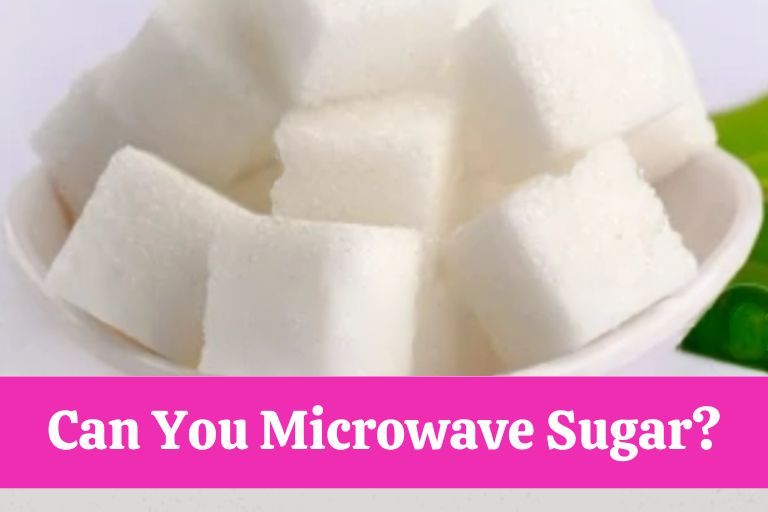Using the microwave for all your kitchen needs can be tempting, but can you microwave sugar? The answer is complicated. Sugar can melt and caramelize in a microwave oven if heated for too long or at too high of a temperature.
But if done correctly, microwaving sugar can be an effective way of melting it with minimal risk of burning or scorching. In this article, we’ll discuss the potential risks of microwaving sugar and how to do it safely.
| Can You Microwave Sugar? |
|---|
| Yes, you can cook sugar in a microwave. However, it is best to dilute the sugar in liquid and stir it occasionally for even heat distribution. If done properly, cooking sugar in a microwave will produce a light caramelized syrup. |
How long do you put sugar in the microwave?
It is not recommended to microwave sugar as it can be a fire hazard. If microwaving sugar is necessary, use only a very small amount and heat it in short bursts. Check the sugar every few seconds until it reaches the desired consistency or temperature.
Is it safe to put sugar water in the microwave?
Yes, it is safe to put sugar water in the microwave. Heat can cause some of the particles in the sugar water to break down and become unstable, resulting in burning or explosions. However, if you observe proper safety precautions, such as stirring regularly and setting an appropriate cook time, you can safely heat your sugar water in the microwave.
How do you heat sugar?
Yes, you can microwave sugar. Place the sugar in a microwavable container, and heat it at full power for around 30 seconds. Make sure to stir the sugar after about 15 seconds to ensure it is evenly heated. This method can be repeated until all of the sugar has been melted. Additionally, you can melt sugar over low heat using a pot on your stovetop or by placing it into a double boiler for slower and more even heating. Either way, keep an eye on your sugar, as it can burn quickly if left unattended!
What would happen if I microwaved sugar?
If you were to microwave sugar, it would start to caramelize and can even scorch the container. High temperatures can cause the sugar molecules to break down and create a potentially hazardous situation if not monitored closely. It is best not to attempt microwaving sugar, as this can be dangerous and unhealthy. Instead, you can use other methods, such as boiling or heating over a stovetop, to achieve similar results with much less risk.
Why should sugar not be heated?
Heating sugar can be dangerous because it can cause a process called caramelization. This can lead to melted sugar becoming extremely hot and can even cause a fire if left unattended. It is not recommended that you microwave sugar, as the extreme temperatures reached during this process can result in serious injury or damage to your microwave.
Why does sugar spark in the microwave?
Sugar can spark in the microwave because it can create a hot spot where the energy is not distributed evenly. When microwaves heat foods, the molecules start to vibrate and move faster, which can cause concentrated spots of heat that can ignite sugar granules.
Does sugar break down when heated?
Yes, sugar can break down when heated. When heated in a microwave or on the stove, sugar molecules can break apart and form new compounds that can change the flavor and texture of food. However, moderation heating sugar can also help bring out its natural sweetness.
How do you soften hard white sugar?
You can soften hard white sugar by microwaving it in a microwave-safe bowl for a few seconds. Be careful, though, as the sugar can easily become too soft and start to melt if it is in the microwave for too long. Alternatively, you can also try mixing your sugar with a few tablespoons of water and heating it on the stove until it has softened.
What happens when you heat sugar?
Heating sugar can cause it to caramelize and release a burnt smell. When heated, the molecules in the sugar can rearrange and form new chemical compounds that give off an intense aroma. Depending on how hot the sugar is heated, you can end up with anything from lightly-caramelized syrup to blackened carbon. However, it is not recommended to microwave sugar as this can be hazardous due to its explosive nature.
Can you heat sugar without water?
Yes, you can heat sugar without water. The best way to do this is in a dry pan over medium-high heat, stirring the sugar constantly until it melts and becomes a liquid. You can also use a microwave to melt the sugar, although be careful as the mixture can easily burn if left too long. Be sure to stir the mixture throughout and cook it for short intervals.
Does sugar get sweeter when heated?
Yes, sugar can get sweeter when heated. When heated in a microwave, the water molecules cause the sucrose molecules in the granules to split apart and form fructose and glucose. The result is a mixture of monosaccharides that can dissolve more easily into liquids, making them taste sweeter than before. However, it is important to note that if you heat sugar too much, it can caramelize instead and make things taste bitter or burnt. Therefore, it’s best to use caution when microwaving sugar.
What happens when a spoon of sugar is heated?
When a spoon of sugar is heated in the microwave, it will begin to melt and become a liquid. Depending on the heating time, it can also caramelize and form large clumps or burn. When microwaving sugar, it’s important to keep an eye on it since microwaves can heat quickly and easily burn your food if left too long.
Is burning sugar toxic?
Is it safe to put sugar water in the microwave?
Yes, it is safe to put sugar water in the microwave. Heat can cause some of the particles in the sugar water to break down and become unstable, resulting in burning or explosions. However, if you observe proper safety precautions, such as stirring regularly and setting an appropriate cook time, you can safely heat your sugar water in the microwave.
Why does sugar turn black when heated?
Sugar will turn black when heated due to the Maillard reaction. The Maillard reaction is a chemical reaction between amino acids and reducing sugars that gives cooked food a distinctive flavor. Excess heating can lead to burning, as the sugar molecules break down and form new compounds, causing them to darken or even char.
What is melted sugar called?
Melted sugar is called caramel. Caramel can be made by melting sugar in a saucepan, microwave, or oven. It can also be flavored with butter and milk to make creamy versions of the treat. Caramel can then be used for various dessert recipes like tarts and ice cream sauces.
Does white sugar turn brown when heated?
Yes, white sugar can turn brown when heated. When exposed to high temperatures, like what can be achieved in a microwave oven, the sucrose molecules can go through a process called caramelization and cause the sugar to change color and acquire a more intense flavor. It is best to avoid microwaving white sugar due to its potential for burning easily.
At what temperature does sugar dissolve?
Sugar dissolves at temperatures above 180°F (82°C). However, can you microwave sugar? Technically yes, but it will caramelize and can easily burn. It can also create hot spots that ignite other microwave items. For these reasons, microwaving sugar is not recommended.
What happens when you heat sugar and water?
When you heat sugar and water, the sugar will dissolve into the water as it is heated. This can be done in a pan on the stove or in the microwave. The heat causes the molecules of both substances to break down and mix, creating a homogenous solution. As more heat is applied, however, some caramelization of the sugars can cause browning or burning if not carefully. Therefore it is important to keep an eye on your mixture when heating with either method and occasionally stir for even heating.
Is hardened sugar still good?
Yes, hardened sugar can still be used in recipes and microwaved if necessary. It may take a bit more time than granulated or powdered sugar, but it is still good for baking and other uses requiring a sweetener. Be sure to scrape away any hardened pieces before using the sugar in recipes.
How do you remove hardened sugar?
The best way to remove hardened sugar is to boil it in a water-vinegar solution. Fill a pot with enough water and vinegar (1 tablespoon of white vinegar per cup of water) to cover the sugar, then place it over medium heat. Once the mixture starts boiling, reduce the heat, add more vinegar if necessary, and stir until all the sugar has dissolved completely.
Then allow it to cool and strain out any solid pieces before using them immediately or storing them for later use. You can also try microwaving hardened sugar with a little liquid such as butter, oil, or syrup to help dissolve it faster!
How do you get rid of hardened sugar?
The best way to get rid of hardened sugar is to dissolve it in a liquid such as water or oil. You can also try microwaving the sugar in a bowl lined with damp paper towels; this can help break down the lumps and soften the sugar. However, never attempt to microwave dry sugar as it can result in an explosion or fire hazard. Additionally, always exercise caution when removing hardened sugar, as boiling liquids can cause serious burns.
How do you caramelize the sugar in the microwave?
To caramelize the sugar in the microwave, place 1/2 cup sugar on a heat-safe plate. Microwave the sugar for 2 minutes, then stir and heat for another 30 seconds. Once the sugar is melted and golden brown, remove it from the microwave and use it as desired. Be cautious when handling hot sugar, as it can cause severe burns!
What does heated sugar taste like?
Generally, most mixtures containing sugar can be microwaved. However, it is important to remember that sugar can burn quickly due to its high heat sensitivity. Depending on the recipe, it may take some experimentation to determine the best cooking time and power level for your specific microwaving needs.
Conclusion
We hope this article has helped answer your question regarding whether you can microwave sugar – let us know if there are any other questions we can help answer!




